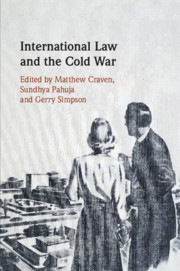Book contents
- International Law and the Cold War
- International Law and the Cold War
- Copyright page
- Dedication
- Contents
- Figures
- About the Editors
- About the Authors
- Acknowledgements
- 1 Reading and Unreading a Historiography of Hiatus
- Part I The Anti-linear Cold War
- 2 International Law and the Cold War: Reflections on the Concept of History
- 3 The Elusive Peace of Panmunjom
- Part II The Generative/Productive Cold War
- Part III The Parochial/Plural Cold War
- References to Cold War Volume
- Index
2 - International Law and the Cold War: Reflections on the Concept of History
from Part I - The Anti-linear Cold War
Published online by Cambridge University Press: 05 December 2019
- International Law and the Cold War
- International Law and the Cold War
- Copyright page
- Dedication
- Contents
- Figures
- About the Editors
- About the Authors
- Acknowledgements
- 1 Reading and Unreading a Historiography of Hiatus
- Part I The Anti-linear Cold War
- 2 International Law and the Cold War: Reflections on the Concept of History
- 3 The Elusive Peace of Panmunjom
- Part II The Generative/Productive Cold War
- Part III The Parochial/Plural Cold War
- References to Cold War Volume
- Index
Summary
Drawing upon Carl Schmitt’s idea of the katechon - a theological figure of the ‘restrainer’ - it is argued that two different accounts of ‘restraint’ operate within contemporary historiography. In one, the USA and the Soviet Union assume the role of the katechon during the Cold War, holding at bay an earthly apocalypse, securing stability through their mutual enmity. In the other, liberal account, it is the Cold War itself that acts as the restrainer, holding back the promises of Kant’s enlightenment project of world government, and of the securing of global peace through law. Each of these accounts has problematic effects: either by operating as an apology for the power of the guarantors of order, or by denying/deferring responsibility for the present state of affairs. We are therefore asked to think, instead, about international law and its history through the lens of Walter Benjamin’s conception of ‘weak messianic power’.
Keywords
- Type
- Chapter
- Information
- International Law and the Cold War , pp. 27 - 48Publisher: Cambridge University PressPrint publication year: 2019
- 1
- Cited by

